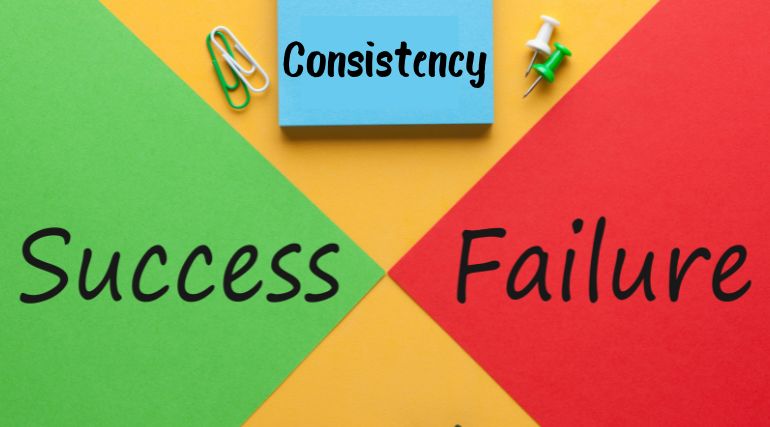Tightened tummies and sweaty hands are common in schools all across the world. If you ask any foreign or domestic student who has suffered from their fear of failure, they will most likely cite numerous instances.
Some students are concerned about missing crucial material in classes or lectures because they believe it will have a negative impact on their exam performance. Others are concerned about exam day because they think they are unprepared. The remainder is terrified of the results day, believing only disappointment awaits them.
All of this is common. We live in a culture that places a high value on performance, perfection, and success. Parents are never hesitant about communicating their high expectations, and neither are distant relatives you only meet once a year at family gatherings.
The fear of failure is everywhere
We are all humans. That means we enter this world with a plethora of options for personal development and improvement. We're all on this road to better ourselves (and the world around us). But we must first fail.
Sim Sitkin, a Duke University professor, coined the phrase "intelligent failures." Intelligent failures are beneficial because they provide us with information, value, and insight. What is critical to remember is that we must halt and ponder. We must pay great attention to our failures in order to learn from them.
Failure is crucial to learn from since it puts us one step closer to success. According to statistics, one in every four entrepreneurs fails before succeeding. It's important to emphasize that conquering the fear of failing does not imply foregoing true interest. It entails perceiving difficulties as opportunities and acknowledging but not dwelling over the negative repercussions of underachievement. Anyone, with the correct attitude, may cut the cords of the unseen puppet master creating havoc in their thoughts.
Learn from the failures
In the corporate world, there is rarely success without failure. You will fail while you pursue your entrepreneurial aspirations. Failure, it is frequently stated, does not stop people; it is how people manage failure that does. When you fail, confront it full-on and learn from your errors. Recognize that not every idea that comes to you will succeed. After a failure, take the time to arrange your thoughts and figure out what went wrong. Above all, be eager to learn and improve.
You’ll learn a lot from failures when you stay humble
When you're doing well in life, it seems like nothing can stop you. There are no words that can adequately describe the sensation of being on top of the world. However, when failure strikes, it hurts. Sometimes it hurts so much that you believe you'll never be successful again. Staying humble helps to alleviate the intense feelings of loss and failure. While you're high on accomplishment, remember that you're human, and treat everybody with the same respect and humbleness that you seek in turn. When you're humbled, you're mentally prepared for failure.
Failure fosters creativity
If you fail by following a traditional road to success, you may have to forge a new path when you try again. This demands imagination. Starting a new firm after a loss may necessitate exploring unusual approaches, and some argue that this type of inventiveness is essential for commercial success.
You learn to listen to yourself
Shame may follow failure if you allow it. Learn to tune out any negative, non-constructive criticism that comes from failure. Building self-assurance can enhance your confidence when you attempt again, potentially leading to future success.
You’ll learn what to do better next time
It's easy to believe that if you make a mistake once, you shouldn't attempt it again. Failure can educate you that failing once does not imply you will never reach the achievement you seek. If you can understand the actions that lead to your failure and why they produced the consequences they did, you may devise a future success plan that avoids these perilous previous processes.
Resources to navigate you through failures
Mistakes are an essential part of the learning process. Yes, smart brains are sometimes the most nervous individuals; yet, an academic journey should be remembered fondly, especially if it is in a foreign nation.
If your worries are too great, consider what Michael Jordan famously said: "I’ve missed more than 9,000 shots in my career. I’ve lost almost 300 games. Twenty-six times I’ve been trusted to take the game-winning shot and missed. I’ve failed over and over and over again in my life. And that is why I succeed."
If you're searching for a more extensive pep talk to help you realize your potential rather than restrict it, here are some books, Podcasts, and TED Talks that reflect Jordan's thoughts in various ways:
TED Talk: ‘Success, failure, and the drive to keep creating’ by Elizabeth Gilbert
"I liked writing more than I liked failing at it, which is to say I liked writing more than I liked my own ego."
Elizabeth Gilbert was a diner server who spent six hard years attempting to get published around 20 years before she gained fame with "Eat, Pray, Love." In this TEDTalk, she discusses her path, how identifying this era helped her accept the failure of her runaway hit's follow-up, and why it didn't stop her from producing another book, which was warmly appreciated.
TED Talk: ‘What I Learned From 100 Days of Rejection’ by Jia Jiang
Jia Jiang discusses an unpleasant experience from his youth in this intriguing TED Talk.
He claims it is simple to see why he developed a fear of rejection later in life. He had hopes and aspirations, but he put them aside for a long period, preferring the more natural option.
This is what propelled his voyage into "rejection" and the community that helps individuals overcome their anxieties of rejection so that they may accomplish their aspirations in the blink of an eye.
TED Talk: ‘Rethinking Failure’ by Barbara Corcoran
Despite her brilliance, Barbara Corcoran has experienced failure too. Corcoran delves into the impact failure has had in her career in her TEDx Talk at Barnard College, and how she's learned to accept it by throwing her concerns to the side.
Most of your fear is something you made up in your imagination. You, too, have the ability to rethink and reinvent what it means to you. And, like Corcoran, you could find that your "greatest accomplishments come after failure."
TED Talk: ‘The Power of Not Always Fitting In’ by Marianne Cantwell
"Imposter syndrome" is one of the most widespread anxieties among entrepreneurs. On the surface, you appear cool, serene, and in command. You're filled with self-doubt and uncertainty on the inside. Many people may identify with this, and when Marianne Cantwell broke it down for her TEDx Talk at Norwich Education, the crowd hung on her every word.
Cantwell recently canceled a successful online program, despite continued demand, after eight years of developing a community of lifestyle entrepreneurs because it no longer resonated with her definition of success.
As you can expect, this caused a great deal of inner conflict, yet it is frequently this upheaval that reveals a latent power. Fear of not being good enough (or doing the wrong thing) may frequently lead to your greatest achievement yet. Like Cantwell, you may discover that life is not black and white.
Book: ‘Go for No! Yes is the destination, No is how you get there’ by Richard Fenton and Andrea Waltz
To some extent, everyone is in sales. Not simply if you work in sales. You are in sales if you manage an office, operate a firm, submit financing proposals, or are looking for a new job.
And the most common response you will hear as a salesperson is: No.
No! is the leader for a reason. It is both inspiring and useful. Fenton and Waltz separate failure from failing by example in 82 pages. The teachings are more than just feel-good cliches. Rather, the book takes you to step by step from seeming failure to true achievement. Although our list strives to provide valuable books for a variety of preferences, Go for No! is at the top for a reason. It will provide you with practical strategies for transforming seeming problems into positives.
Book: Failing Forward: Turning mistakes into stepping stones for successful
Although this list focuses on recent works, no realistic list on developing success from failure can exclude this 2007 classic. Despite its scholarly approach, Failing Forward is a short and enjoyable read. Maxwell makes extensive use of scientific findings and historical tales. In doing so, he builds a case for why you should not only stop fearing failure but also embrace it as a route to future success.
Maxwell's method will be both useful and motivating to the reader. Perceived drawbacks become benefits. And you will definitely feel inspired with new skills to utilize in both your work and personal life.
Book: ‘How to fail at almost everything and still win big: kind of the story of my life’ by Scott Adams
Traditional job advice might not apply to everyone. This is the reason this book is groundbreaking. Scott Adams tells you how to turn your life's misfortunes into chances for achievement. Learn the tactics and strategies he utilized to rise from obscurity to become the world-renowned creator of Dilbert — all while providing assured amusement.
Book: ‘Spartan Up!: A take-no-prisoners guide to overcoming obstacles and achieving peak performance in life’ by Joe De Sena
Twenty-six and two miles is no longer sufficient. Obstacle course racing has taken the globe by storm, combining the endurance trials of a marathon with the mind-bending rigors of conquering obstacles along the route. Joe De Sena, the driving force behind the tremendously successful Spartan Race, is at the epicenter of this phenomenon. De Sena's mentality is straightforward: set a goal, put in the effort, and complete it. Spartan Race was developed from that principle, as it was acted out first in his own life and now for millions over trails, through the muck, and up slopes.
In Spartan Up! De Sena provides you with a life strategy plan that forces you to step outside of your comfort bubble and into a battle zone. You'll learn how to:
- overcome your greatest challenge—willpower;
- embrace your greatest ally—discipline;
- eliminate restrictions and develop a new normal; and
- attain the ultimate: obstacle immunity.
Other events produce sheep; the Spartan Race produces wolves. Spartan Up! can help anybody accomplish their full potential—in life, career, relationships, or everything else they set out to do. It is filled with compelling anecdotes of Spartan racers as well as hard-won lessons gained along the way. It is the plan that propels you forward. Continue to the finish line.
Our final words
You will find the answers if you ask yourself. Learn to listen to and trust your intuition. Overcoming your fear is just as difficult as you make it. When you confront your worries, you learn they aren't as horrible as you feared they would be.
So, what is it going to be?
Regardless of your anxieties, pursue your dreams. You'd undoubtedly be living the life you've always wanted. You would no longer have to look back on your life with remorse. To live a regret-free life, you must be willing to make mistakes. Toss some paint on the canvas and watch what transpires. Live your life for yourself, not for others.












